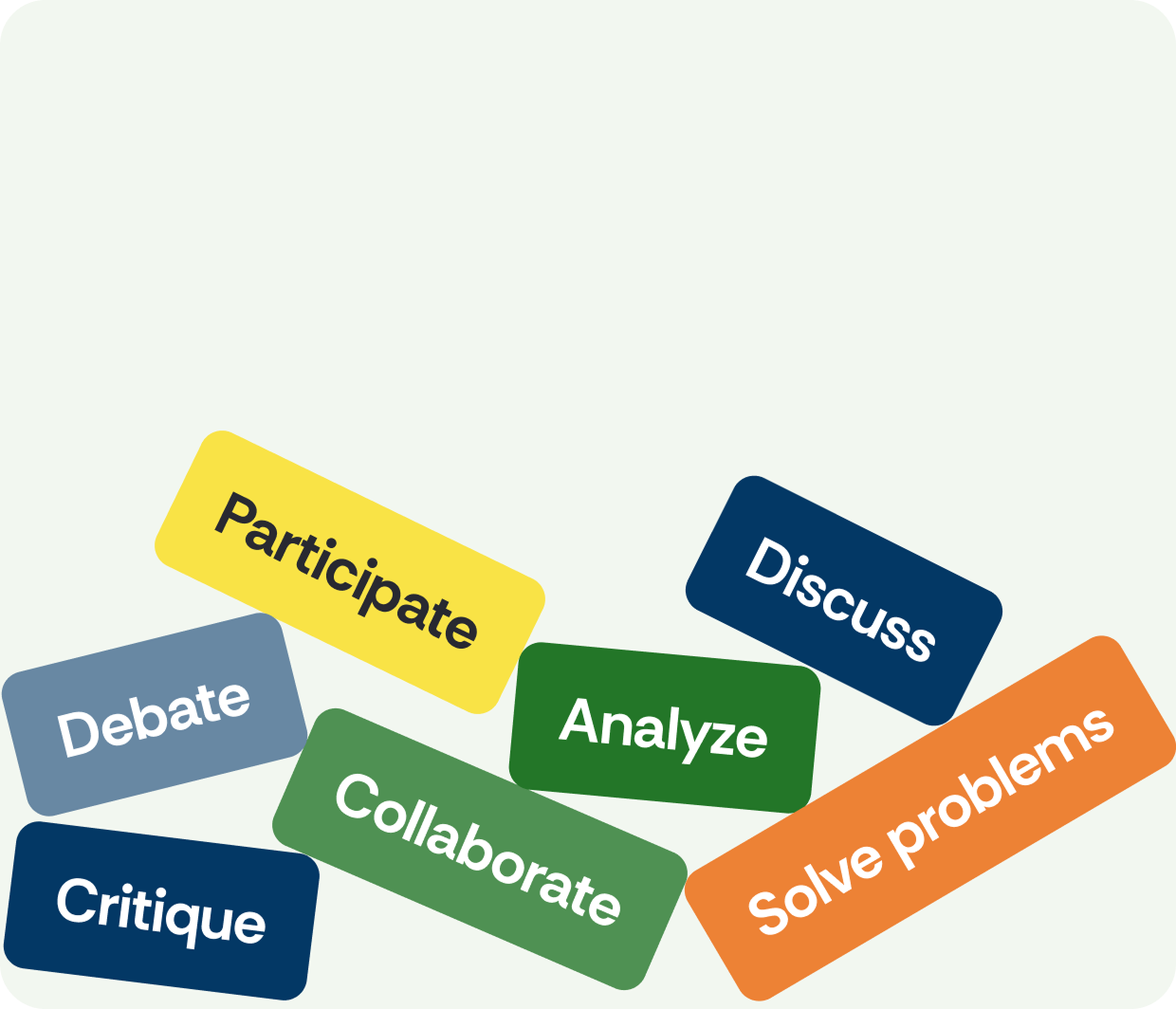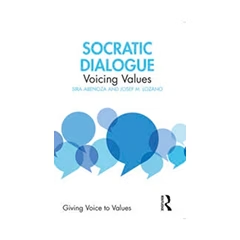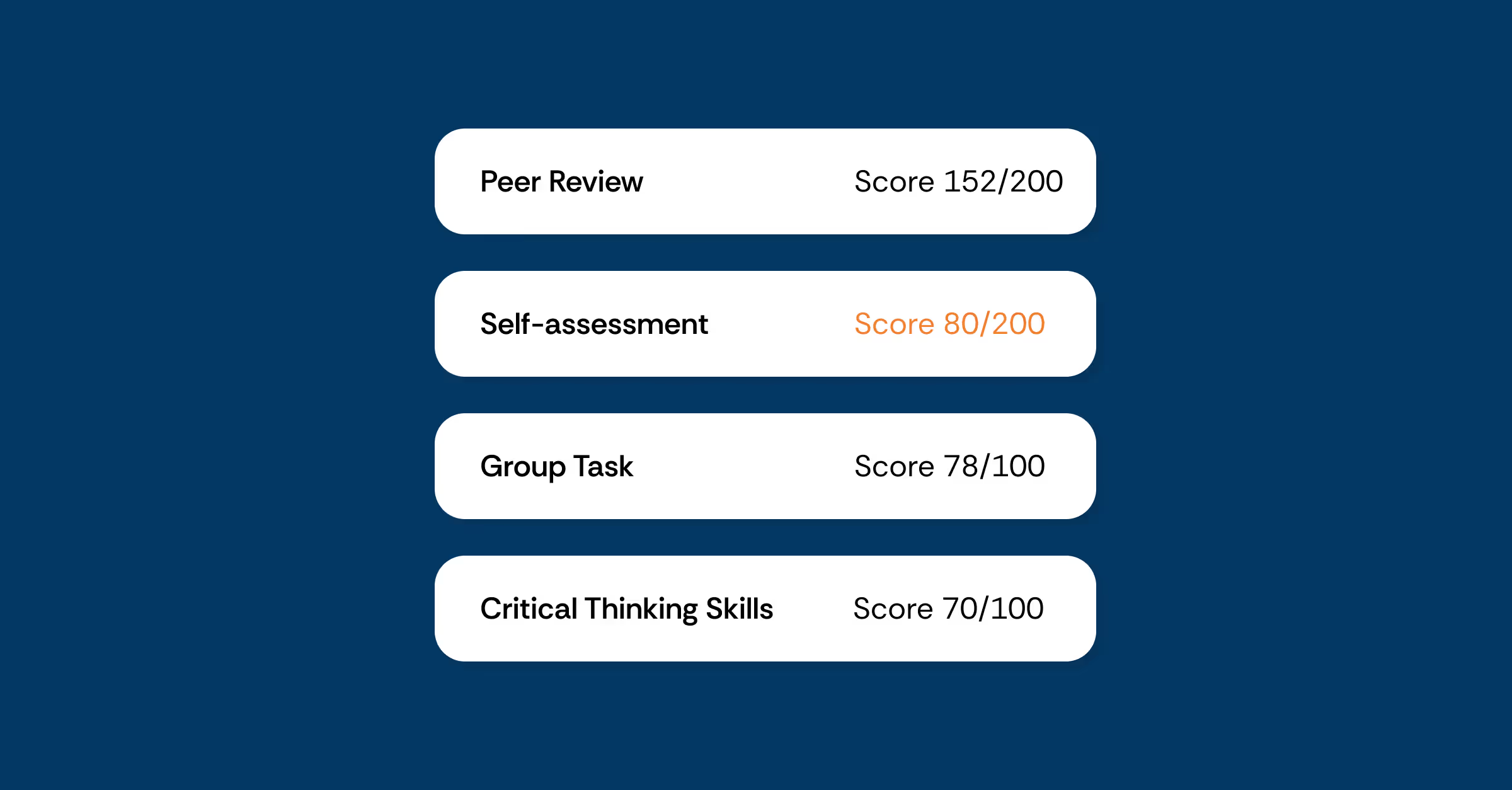Socratic Method supported by FeedbackFruits
Illuminate minds through inquiry—engage students in dynamic, thought-provoking dialogues that challenge assumptions, cultivate critical thinking, and refine reasoning skills.

What are socratic method?
The socratic method is a teaching approach that fosters learning through inquiry, dialogue, and critical reflection. Instead of passively receiving information, students engage in structured discussions driven by open-ended questioning, challenging assumptions, and refining their reasoning. This method cultivates deep understanding, intellectual agility, and the ability to analyze complex ideas, promoting a lifelong habit of thoughtful inquiry.

Why socratic method?
The Socratic Method engages students in thoughtful dialogue, fostering deeper understanding, critical thinking, and intellectual independence. Research highlights that learning through questioning and discussion enhances reasoning skills, argument analysis, and the ability to navigate complex ideas. By encouraging inquiry, reflection, and rigorous debate, this pedagogy cultivates curiosity, sharpens analytical thinking, and empowers learners to construct well-founded perspectives through active engagement.
Book a demoSignificantly enhanced critical thinking
Enhance critical thinking by improving students’ ability to recognize assumptions, evaluate arguments, and draw conclusions. In a study of 371 undergraduate business students, those who engaged in Socratic discussions demonstrated measurable improvements in critical thinking.
.avif)
E. Boa, et al., 2018
The development and validation of the Blended Socratic Method of Teaching (BSMT): An instructional model to enhance critical thinking skills of undergraduate business students
Improved decision-making
The socratic method sharpens decision-making by fostering deep analysis, challenging assumptions, and promoting adaptable thinking. This structured approach reduces bias and enhances problem-solving clarity, empowering business professionals to make more informed, strategic decisions.

E. Peterson, 2011
Socratic Problem-Solving In The Business World
Developing Ethical Insight
Use the socratic method to fosters ethical reasoning and cognitive flexibility, enabling individuals to critically examine their values, challenge assumptions, and make more reflective decisions.

Abenoza, S., & Lozano, J. M., 2019
Socratic dialogue: Voicing values with Palgrave Macmillan

How does FeedbackFruits support socratic method?
The Socratic Method encourages learning through inquiry, dialogue, and critical reflection, all of which can be effectively supported through FeedbackFruits. By fostering structured discussions, peer interactions, and collaborative reflection, educators can create dynamic learning experiences that encourage deeper understanding and analytical reasoning. FeedbackFruits enables this by facilitating thoughtful discussions, promoting meaningful peer feedback, and providing insights into student engagement, ensuring that learning remains interactive and reflective. With features that support dialogue, peer evaluation, and collaborative annotation, FeedbackFruits helps educators design learning environments where students actively question, challenge ideas, and refine their reasoning through structured inquiry.
Get started with the socratic method using our pre-made learning templates
These templates—designed by experienced educators—offer proven structures for implementing the socratic method. Simply select a template, customize it, and launch engaging activities in minutes.
Browse all templatesSocratic method, directly within your LMS
FeedbackFruits integrates seamlessly with your Learning Management System, making it simple to incorporate socratic activities into your existing courses. Whether you teach online, hybrid, or face-to-face, FeedbackFruits ensures that activating student participation is just a few clicks away—no additional overhead, no steep learning curve.





Explore our free resources about socratic method

Experiential Learning: a guide
A comprehensive guide to help educators design assessment activities that built upon real-world application, active engagement, and collaboration
Read more
Unlocking student potential with the Applied Soft Skills Pedagogy
This article introduces authentic assessment, an approach that engage students in authentic experiences and measure their performance.
Read more
Fostering Learner Engagement through Self-Assessment
At the Faculty of Science, Engineering and Built Environment, Dr. Gunning and her team implemented a 2-year long, multi-faceted project to prepare students for the world of work and encourage lifelong learning.
Read moreSee what FeedbackFruits learning activities can be used to support socratic method
Socratic method is hard. FeedbackFruits makes
it easier.
Unlock the full potential of socratic method and more with the Learning Design System.
Explore the Learning Design System










